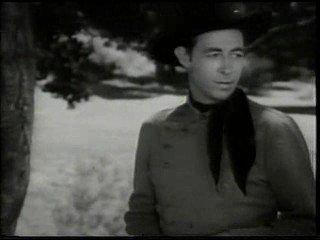|
According
to both Roy Rogers and Gene
Autry, the two most successful stars of the ‘singing cowboy’ era
of Westerns, the best singing cowboy of all was Eddie Dean. Eddie
Who?
He was born Edgar Dean Glosup in 1907 in Posey,
Hopkins County,
Texas. He had, once his voice developed, a rich, almost operatic-quality
baritone. His father, a schoolteacher, urged him to pursue a career
in music. After a stint with several gospel quartets on the Southern
gospel circuit, Eddie and his brother Jimmie joined the National Barn
Dance on WLS in Chicago, becoming the first ‘singing brothers’ act
in country-music history. For a time the Glosup brothers had a show
of their own on a station in Yankton, South Dakota.
Eventually the brothers drifted to California, ending up in Hollywood.
There, for entertainment purposes, they dropped the Glosup name and
became the Dean Brothers. Eddie, the more handsome of the two, began
getting bit-parts in movies as early as 1935, though his brief career
as a singing cowboy would not begin until considerably later.
Eddie Dean was a songwriter as well as a singing cowboy, and his songwriting
career lasted much longer than his movie career. Among the Eddie Dean
songs still heard on Country-Western radio today are One Has My
Name (The Other Has My Heart) and Hillbilly Heaven,
first recorded by Eddie in the 1950s and later a major hit for Tex
Ritter. Each Eddie Dean singing cowboy movie included at least
three songs. Eddie wrote eighty percent of them.
One of Eddie’s early sidekicks was another musician—and another
Texan—Glen Strange. Though we best remember Glen Strange
as Sam the Bartender on Gunsmoke, he was an accomplished musician,
playing fiddle, guitar, and banjo, and a singer as well. He and Eddie
collaborated on writing songs for the movies and became very close
friends. When Strange died Eddie Dean sang at his funeral.
Another sidekick—a non-singer—was a fellow named Al LaRue,
who came from Gretna, Louisiana. He played ‘The Cheyenne Kid,‘ who
was supposed to be an expert with a bullwhip. According to Al LaRue
himself, in an interview before his death, he had never before handled
a bullwhip in his life, but he desperately wanted the part. “I nearly
tore all the hide off my body,” he said, teaching himself to handle
the whip. Apparently his skill impressed the casting director, because
he got the part. After leaving as Eddie’s sidekick his bullwhip prowess
earned him stardom on his own—as ‘Lash LaRue.’
Eddie also worked with Hollywood holster-make and fast-draw instructor
Arvo Ojala. He was one of the first movie cowboys to use Ojala’s
revolutionary metal-lined holsters on film. At one point he was considered
the ‘fastest gun’ in Westerns.
Eddie
Dean was perhaps the most innovative of the cowboy movie heroes, both
singing and action. Instead of riding a single horse in all his films,
as the other cowboy stars, both singing and action did, he had three
different horses during his career—a paint, a sorrel, and a coal-black
horse with a white flash on the animal’s face. When asked why he changed
horses, he reportedly said “I don’t want to be upstaged by my own
horse.” Trigger, Champion, White Flash, Koko, Silver, Tarzan and dozens
of movie-cowboy horses were as popular as their riders, but Eddie
avoided that by changing horses.
For a movie-cowboy hero to be seen to shed tears was an absolute no-no.
A hero might show anger or sadness at the death of a friend, but never
shed tears.. Eddie broke the mold. He was seen to shed tears on screen
over the body of a dead friend.
Another taboo was shooting a woman. A hero might overpower a female
criminal and haul her off to jail, but he could never shoot her. Eddie
broke that taboo as well, in one of his last films. The bad girl in
this case was none other than Jennifer Holt, action-cowboy hero Tim
Holt’s sister. She’d played Eddie’s leading lady in several previous
films, but in this one—her last film with Eddie and one of her own
last films—she played a really mean, sneaky outlaw gang leader. She
later stated playing that part was her favorite role in all the films
she did. “I could be nasty to everybody if I wanted to,” she’s quoted
as saying.
Eddie made eighteen Westerns, five in color, before ending his singing-cowboy
career in 1945. He later appeared in a live-TV Western broadcast only
on the West Coast. It was called The Marshal of Gunsight Pass,
and lasted only one season. He later made rare guest appearances on
television, most notably on Petticoat Junction, and continued
his songwriting and recording career. Eddie Dean’s recordings, though,
are difficult to find because he never recorded with a major label.
|
 |
Unlike
many Hollywood stars, Eddie had only one wife, Lorraine, whom he called
‘Dearest.’ The couple had two children, a son and a daughter, neither
of which went into show business. When Eddie died in 1999 he and ‘Dearest’
had been married sixty-one years. When Lorraine followed him to the
grave in 2002, under her name on the headstone—which is marked ‘Glosup,’
not ‘Dean’--was carved ‘Dearest.’
© C. F.
Eckhardt
January 11, 2014 column
More "Charley Eckhardt's Texas"
|
Texas Books
by C. F. Eckhardt
|
|
|
